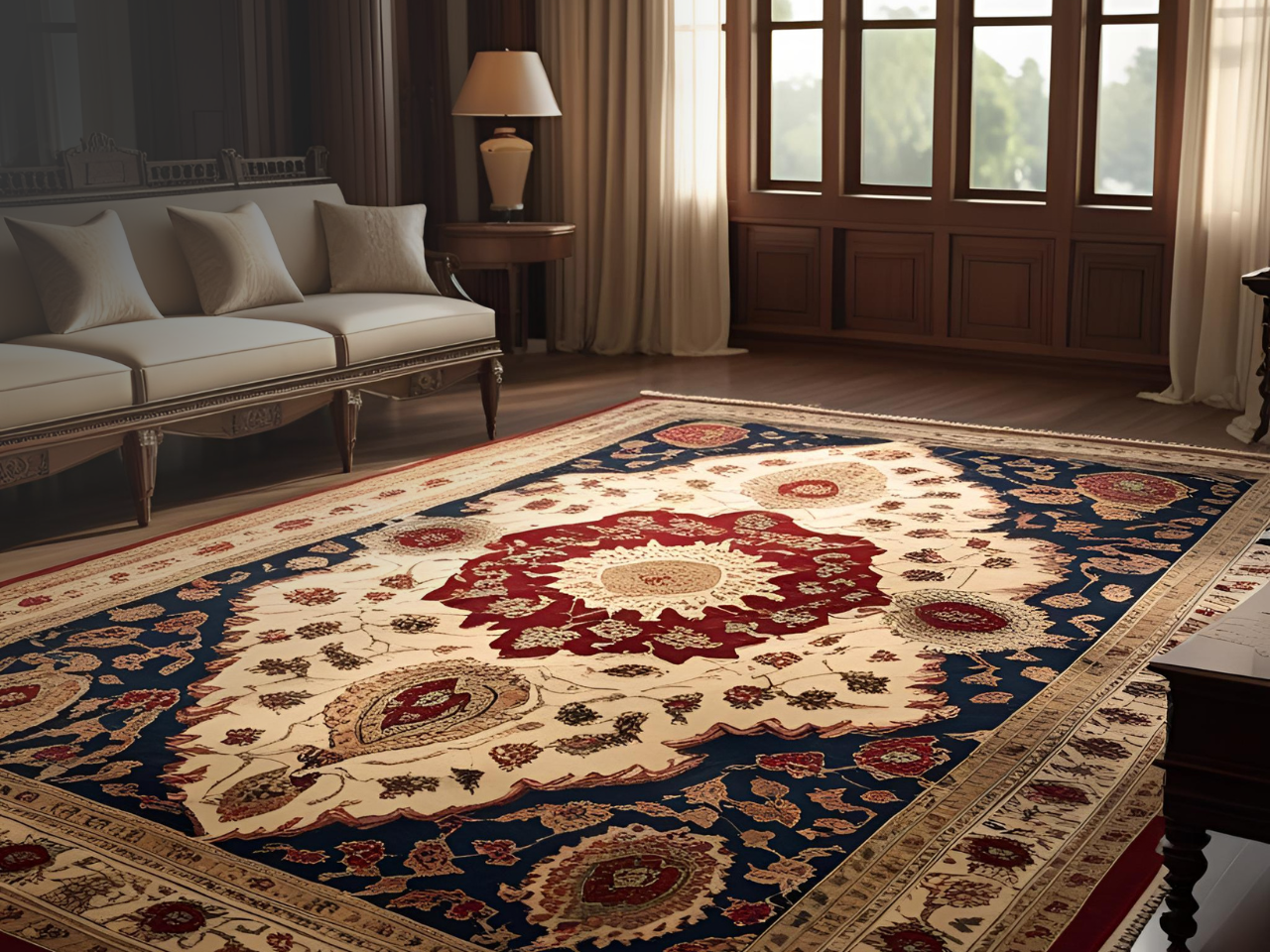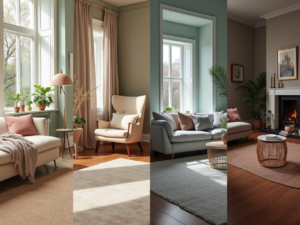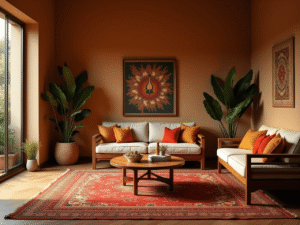The rhythmic sound of looms and the gentle whisper of silk threads have echoed through India’s ancient carpet-weaving towns for centuries. This timeless craft transforms raw materials into breathtaking floor art that graces homes across the globe. Yet finding authentic, high-quality handmade carpets in India can feel overwhelming with countless options and varying quality standards.
Handmade carpets represent more than mere floor coverings—they embody cultural heritage, support skilled artisans, and offer unmatched durability. Unlike machine-made alternatives, these pieces carry the soul of their creators, displaying subtle imperfections that make each carpet unique. This guide will help you navigate India’s rich carpet market, from understanding quality markers to discovering the best places to buy these treasured pieces.
What Makes a Carpet ‘High-Quality’ and ‘Handmade’?
Characteristics of Premium Handmade Carpets
A truly exceptional handmade carpet displays several distinctive features. Knot density serves as the primary quality indicator—premium carpets contain 200-400 knots per square inch, while luxury pieces may exceed 1,000 knots. Higher knot counts create finer details, sharper patterns, and superior durability.
Material quality significantly impacts both appearance and longevity. Pure wool creates resilient, naturally stain-resistant carpets that improve with age. Silk produces lustrous, delicate pieces perfect for low-traffic areas. Bamboo silk offers an affordable alternative with silk-like shine, while cotton provides structural foundation in many designs.
Design precision reveals the weaver’s skill level. Hand-knotted carpets feature consistent patterns with clean lines and balanced proportions. Color gradations should appear smooth and natural, while borders should align perfectly with the central design.
Types of Weaving Techniques
Hand-Knotted Carpets: The most prestigious technique involves tying individual knots around warp threads. This labor-intensive process creates extremely durable carpets that can last generations. Each knot is cut individually, creating a dense, plush pile.
Hand-Tufted Carpets: Artisans punch yarn through a canvas backing using a tufting gun, then secure it with latex coating. This faster method produces quality carpets at lower prices while maintaining handmade appeal.
Flatweave and Dhurries: These techniques create flat, reversible carpets without pile. Weavers interlace warp and weft threads to form patterns, resulting in lightweight, versatile pieces perfect for casual settings.
Differentiating Genuine Handmade from Factory Replicas
Authentic handmade carpets display certain telltale signs. Examine the back—hand-knotted pieces show clear individual knots, while machine-made carpets reveal uniform grid patterns. Hand-knotted carpets often have slight irregularities in pattern or color that add character.
Check the fringe carefully. Genuine handmade carpets have fringes that are integral parts of the weaving structure, not sewn-on additions. The pile should feel dense and spring back when pressed, indicating quality wool and proper knotting technique.
Popular Regions in India Known for Handmade Carpets
Bhadohi & Mirzapur (Uttar Pradesh)
Known as India’s carpet capital, Bhadohi produces over 90% of the country’s hand-knotted carpets. This region’s 400-year weaving tradition combines Persian techniques with Indian aesthetics. The town’s skilled artisans create everything from traditional Persian designs to contemporary patterns for global markets.
Mirzapur, Bhadohi’s neighboring city, specializes in both hand-knotted and hand-tufted carpets. The region’s integrated supply chain—from yarn dyeing to finishing—ensures consistent quality control and competitive pricing.
Jaipur (Rajasthan)
Rajasthan’s pink city boasts a rich heritage of textile arts, including exceptional carpet weaving. Jaipur’s artisans excel at creating vibrant, geometric patterns inspired by Mughal architecture and desert landscapes. The city’s established trade networks make it a hub for both traditional and contemporary carpet designs.
Srinagar (Kashmir)
Kashmir’s carpet industry creates some of India’s finest silk-on-silk pieces. Kashmiri artisans are renowned for their intricate craftsmanship, often incorporating 900+ knots per square inch. These carpets feature elaborate Persian-influenced designs with hunting scenes, floral motifs, and prayer rugs.
The region’s carpets command premium prices due to their exceptional quality and the time-intensive creation process. A single Kashmir silk carpet can take several months to complete.
Panipat (Haryana)
Panipat has emerged as a modern carpet manufacturing center, specializing in hand-tufted and machine-made carpets. The city’s strategic location near Delhi makes it accessible to both domestic and international buyers. Panipat’s manufacturers often blend traditional techniques with modern designs to create contemporary pieces.
Best Places to Buy High-Quality Handmade Carpets in India
Offline Stores and Showrooms
1. The Ambiente (Delhi)
Located in Sultanpur, New Delhi, The Ambiente represents the perfect fusion of traditional Bhadohi craftsmanship and contemporary design. Founded by Avani Khandelwal, this design-led rug atelier draws from 30+ years of expertise through its parent company, Bhadohi Carpets.
The Ambiente’s unique selling proposition lies in its commitment to supporting over 4,000 women weavers while creating accessible luxury. Their collection ranges from affordable pieces to premium silk carpets, all crafted with meticulous attention to detail. The brand offers free consultations with design experts, helping customers select perfect pieces for their spaces.
What sets The Ambiente apart is their emphasis on storytelling through rugs. Each piece reflects India’s rich cultural heritage while embracing modern aesthetics. Their sustainable practices and artisan empowerment initiatives make them a socially conscious choice for discerning buyers.
2. Jaipur Rugs (Jaipur, Delhi, Mumbai + Online)
This social impact brand collaborates with over 40,000 artisans across India, creating a vast network of skilled craftspeople. Jaipur Rugs focuses on certified hand-knotted carpets that blend traditional techniques with contemporary designs. Their transparency in sourcing and fair trade practices appeal to ethically-minded consumers.
The brand offers extensive customization options, allowing customers to create unique pieces tailored to their specifications. Their showrooms in major cities provide hands-on experience with different textures and designs.
3. Obeetee Carpets (Mirzapur + Major Metros)
Established in 1920, Obeetee has built a global reputation for creating timeless, collectible handmade carpets. Their heritage brand status reflects decades of consistent quality and innovation in carpet manufacturing. The company’s pieces often become family heirlooms passed down through generations.
Obeetee’s strength lies in their master weavers who preserve traditional techniques while adapting to contemporary tastes. Their carpets feature in luxury hotels, palaces, and discerning homes worldwide.
4. Bhadohi Carpets
Specializing in ultra-luxury carpets, Bhadohi Carpets creates pieces for palaces, five-star hotels, and exclusive residences. Their bespoke services allow customers to commission completely custom designs using the finest materials available.
The brand’s designer collections feature collaborations with renowned interior designers and architects. Their attention to detail and use of premium materials justify their position in the luxury market segment.
5. Carpet Cellar (Delhi)
This specialized store focuses on museum-quality antique and contemporary handmade rugs. Carpet Cellar caters to collectors and connoisseurs who appreciate rare, exceptional pieces. Their expertise in antique carpets provides valuable insights into historical weaving techniques and design evolution.
Online Platforms
6. Tasseled Home
This e-commerce platform specializes in contemporary handcrafted pieces with boho and luxury aesthetics. Tasseled Home curates collections from various artisan clusters, offering customers access to diverse regional styles through a single platform.
7. Gaatha Handicrafts
Supporting artisan clusters across India, Gaatha Handicrafts provides a marketplace for traditional craftspeople to reach urban consumers. Their platform emphasizes the stories behind each piece, connecting buyers with the artisans who create them.
8. Amazon Karigar / Flipkart Samarth
These major e-commerce platforms have dedicated sections for verified artisan-led brands. They offer the convenience of online shopping with quality assurance and return policies, making handmade carpets accessible to a broader audience.
Things to Check Before Buying Handmade Carpets
Before making a purchase, examine the knot count and craftsmanship details carefully. Run your hand across the carpet’s surface—quality pieces should feel dense and uniform. Look for consistent color depth and pattern alignment throughout the design.
Request certificates of authenticity or artisan tags that verify the carpet’s handmade status. Many reputable dealers provide documentation detailing the carpet’s origin, materials, and weaving technique.
Inquire about care instructions and durability expectations. Quality handmade carpets should come with detailed maintenance guidelines to preserve their appearance and longevity. Understanding proper care prevents costly damage and extends the carpet’s lifespan.
Review return policies and customization options before committing to a purchase. Reputable dealers offer reasonable return windows and may provide customization services for size, color, or design modifications.
Ask about the materials used and their sources. Sustainable, ethically-sourced materials align with responsible consumption practices while ensuring quality standards.
Price Range for Handmade Carpets in India
Understanding pricing helps set realistic expectations and budget accordingly. Entry-level handmade carpets, including dhurries and basic flatweaves, typically range from ₹5,000 to ₹15,000. These pieces offer authentic handmade appeal without premium pricing.
Mid-range options, including hand-tufted carpets and basic hand-knotted pieces, cost between ₹20,000 and ₹75,000. These carpets balance quality, durability, and affordability for most households.
Premium handmade carpets, featuring silk materials, high knot counts, or custom designs, start at ₹1 lakh and can exceed ₹10 lakhs for exceptional pieces. These investment-grade carpets often appreciate in value over time.
Factors affecting price include material quality, knot density, size, design complexity, and brand reputation. Custom pieces command premium prices due to their unique nature and extended creation time.
How to Care for Handmade Carpets
Proper maintenance preserves your carpet’s beauty and extends its lifespan significantly. Regular vacuuming removes surface dirt and prevents fiber damage, but avoid vacuuming fringes, which can unravel or tear.
Frequently Asked Questions (FAQs)
1. How can I tell if a carpet is truly handmade?
Look for slight irregularities in weave and design, inspect the back of the carpet (knots will be visible), and check for artisan tags or certification. Handmade rugs typically have no glue or machine stitching.
2. Are handmade carpets worth the investment?
Yes. Handmade carpets are long-lasting, often increase in value over time, and serve as heirloom pieces. They also offer unmatched quality, craftsmanship, and uniqueness compared to machine-made alternatives.
3. Can I customize the design, size, and colors of a handmade carpet to fit my specific needs?
Absolutely. Many brands and studios in India offer fully customized handmade carpets, allowing you to select everything from color palette to weave technique and dimensions.
4. What is the typical timeline for creating a custom handmade carpet?
The production time varies depending on size, design complexity, and knot density. On average, it can take anywhere from 4 to 12 weeks, with larger or finer weaves requiring more time.
5. Which state in India is famous for carpets?
Uttar Pradesh (especially Bhadohi and Mirzapur) is known as the “Carpet Capital of India.” Rajasthan (Jaipur), Kashmir (Srinagar), and Haryana (Panipat) are also renowned for their weaving traditions.
6. How do handmade carpets support local artisans and sustainable practices?
When you buy from brands working directly with artisan communities (like The Ambiente or Bhadohi Carpets), you’re helping preserve centuries-old crafts, supporting rural livelihoods, and encouraging sustainable, low-waste production.
7. What is the best way to visualize a carpet in my home before making a purchase?
Many premium brands offer rug visualization tools or AR (augmented reality) apps that allow you to upload room photos and preview how the rug will look in your space. Home trials are also available with select sellers.
8. What are the different types of weaving techniques used in handmade carpets?
Common techniques include:
- Hand-Knotted – intricate and durable (e.g. Persian or Kashmiri carpets)
- Hand-Tufted – faster, with high design flexibility
- Flat-Weave (Dhurries) – lightweight, reversible, and casual
- Soumak Weave – decorative with a braided look
9. How do I choose the right size and shape carpet for my space?
Measure your room and consider furniture layout. For living rooms, leave equal floor space around the carpet. In dining areas, the rug should extend beyond chair legs. Always balance size with the visual scale of your room.





